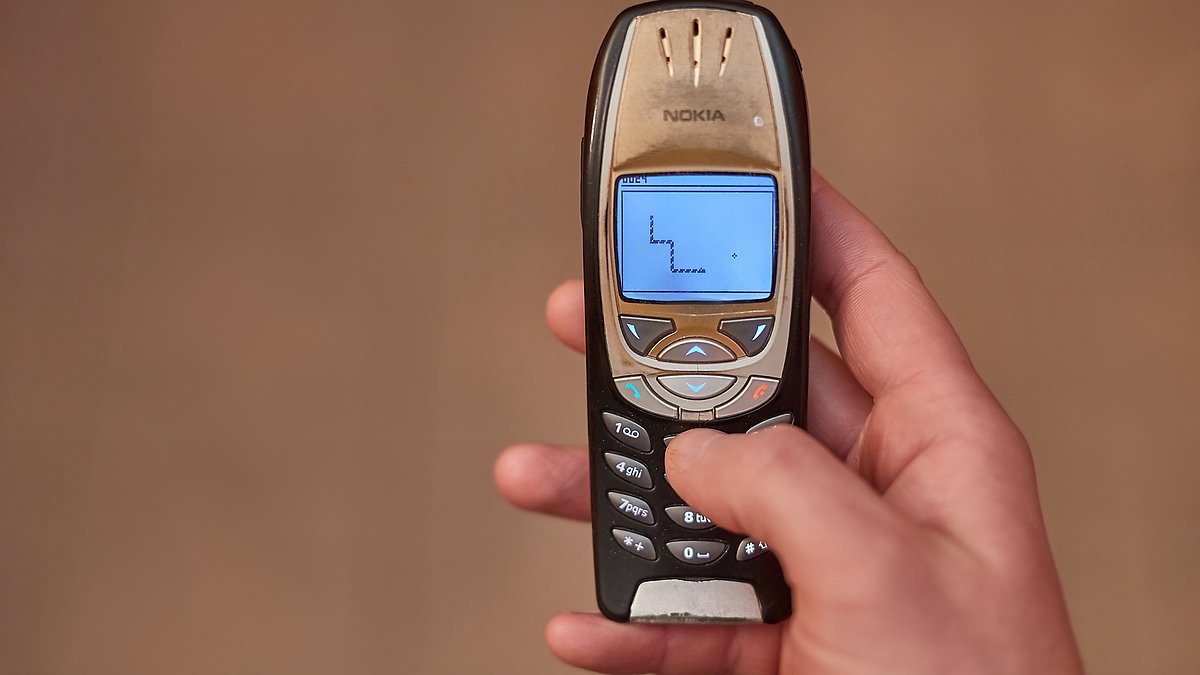A growing number of people are ditching their smartphones for ‘dumbphones’ that only call and text to avoid being in ‘zombie mode.’
The simple devices have skyrocketed in popularity, as 2.8 million were sold in the US last year with people proclaiming they feel calmer and more present in their ordinary lives.
A California woman told DailyMail.com that she made the switch after realizing she spent the entire summer on her smartphone, saying she barely remembered the time – she even forgot where she walked her dog.
Caroline Cadwell explained that switching to a dumbphone was impractical at first, but then became freeing.
‘Space and time, is how I’d describe it. It’s amazing how much your relationships can gain from giving it up,’ she said.

A growing number of people are choosing to ditch smartphones for ‘dumbphones’ that only call and text to avoid being in ‘zombie mode.’ The simple devices have skyrocketed in popularity, as industry experts predict sales in the US will hit 2.8 million by the end of the year
Companies such as Dumbwireless are selling the simple devices devices to addicted smartphone users, and a growing number of anti-smartphone organizations are trying to curb the use of the devices, particularly among children.
Activists point to statistics such as the fact that the arrival of smartphones seems to have coincided with a surge in rates of depression and anxiety – which rose by more than 50 percent between 2010 and 2019.
Read More
Do YOU want a 'dumbphone'? Experts say smartphone owners are increasingly buying second handsets with limited features – but batteries that last for weeks

Cadwell spent 15 years working in high-growth start-ups in Barcelona and San Francisco before she left a job due to burnout – and realized her smartphone was the problem.
‘I left a job because I was burned out, and spent almost three months in what I’d describe as zombie mode, she said.
‘It was summer, and I barely remember it–I did nothing. It was when I was nearly out of this time and feeling better that I started to reflect on what about my burnout was in my control, and the biggest contributing factor was a lack of boundaries with work.’
Previously she had felt the need to be available at all times, even for 11pm calls.
But Cadwell realized the depths of her addiction when she couldn’t remember where she had walked her dog because she was responding to Slack messages the whole time.
She said that switching to a dumbphone was impractical at first, but then became freeing.

Caroline Cadwell told DailyMail.com that she made the switch after realizing she spent the entire summer on her smartphone, saying she barely remembered the time – she even forgot where she walked her dog
‘Space and time, is how I’d describe it. It’s amazing how much your relationships can gain from giving it up,’ said Cadwell.
She has launched a product called Unpluq, which locks away apps on smartphones so people use them more healthily.
Cadwell said that users average 72 minutes per day less on their phones.
‘I think people are starting to tune in at a large scale about the perils of social media and smartphones–very few I think would argue that they’re GOOD for us, 100%, or that social media is ONLY good, she continued.
‘Is there room for more people to take more action? Absolutely, and we’re starting to see that, but I think the younger generations will lead the way on having a different relationship with their smartphones from the get go.’
Stay-at-home Mom and freelance copy editor Christina Dinur switched to a ‘dumbphone’ after being inspired by a friend who had given up her smartphone because it was distracting her from her kids.
‘I had felt the same way for a while, but wasn’t sure what to do about it. I was failing to set healthy boundaries around my smartphone use, but getting a dumbphone seemed so radical,’ said Milwaukee woman Dinur.
‘Talking to my friend about her experience gave me the courage I needed to finally make this change.’
Dinur continued to explain that she was inspired by reading the book ‘The Anxious Generation’ by Jonathan Haidt, which links the arrival of smartphones to a rise in anxiety in young people.
‘The book persuaded me that kids should not have smartphones or social media, but the elephant in the room was my own smartphone addiction,’ she said.
‘I didn’t see how I’d have a leg to stand on in saying ‘no’ when my kids started asking for a smartphone if they saw me glued to my smartphone all the time. Getting a dumbphone has solved that.’

Stay-at-home Mom and freelance copy editor Christina Dinur switched to a ‘dumbphone’ after being inspired by a friend who had given up her smartphone because it was distracting her from her kids
Not having a smartphone has been easier than anticipated, said Dinur – and she has not regretted it at all, even when she has to note down directions on a notepad before leaving the house.
‘I feel so unburdened. I really struggled with self control around my smartphone. I used to pull out my phone constantly to check my email and social media, even though there was rarely ever anything that interesting to see there,’ explained the mom.
‘With the dumbphone, I don’t have that option anymore, and it’s a relief. I feel much calmer and more present with the physical world around me, especially my kids.’
Dinur said that she still uses social media on a laptop, but only checks a few times per day rather than constantly.
‘Even when I log in for the first time in many hours, there still is rarely anything interesting to see there, which really drives home what a waste of time it was when I was checking it dozens of times a day on my smartphone,’ she continued.
Dinur explained that giving up her smartphone has increased her attention span and she is reading more books – and spending more time with her family.
She is now part of the Smartphone Free Childhood US movement and is ensuring her children, aged three and five, don’t grow up with unhealthy digital habits.
Smartphone Free Childhood operates via WhatsApp groups in many U.S. states, and is working with local government and school boards to limit children’s smartphone use.
‘Many adults don’t have the healthiest relationship with their smartphones, so why would we think these devices would be beneficial for kids, whose brains and impulse control are still developing,’ said Dinur.

Stephen Kurczy, author of ‘The Quiet Zone,’ travelled to Green Bank, Virginia – a town with no cellphone coverage due to nearby radio telescopes – and realized it was clear that many people experienced ‘withdrawal’

Stephen Kurczy with his son in Green Bank, Virginia – the ‘Quiet Zone’
Stephen Kurczy, author of ‘The Quiet Zone,’ travelled to Green Bank, Virginia – a town with no cellphone coverage due to nearby radio telescopes – and realized it was clear that many people experienced ‘withdrawal’.
The book examines our relationships with smartphones through the prism of a town where any wireless transmission is rigidly policed.
‘While working on ‘The Quiet Zone,’ I spoke with many people and heard stories of so many more people who went through smartphone withdrawal-like symptoms when visiting Green Bank, West Virginia, where by law there’s no cell service,’ he said.
‘Younger folks seem to break out in hives when they realize their phones won’t work,’ a local told me.
‘Even after visitors are informed that there is no cell service in the Quiet Zone, they tend to instinctively keep checking their devices, like an uncontrollable tick.
‘And there’s research to back that idea up: People touch their smartphone more than 2,600 times a day.’
While writing the book, Kurczy said his wife continually checked her iPhone until, after about a week, she started to adjust to the slower pace of life.
‘It was freeing for her,’ he said.
Kurczy has not personally given up owning a smartphone – because he has never owned one.
‘It’s a way of creating a small amount of quiet in my life. A ton of research now shows that humans are happier and more productive if we’re not online all the time. I get that many people need to have smartphones for work or whatever, the author explained.
‘But I’ve found a way to live without one, and I want others to have that option, too.. I now have two kids, I’ll be damned if they get phones anytime soon.’
He opted never to get a smartphone because he had a hard enough time setting limits on his laptop usage.
‘I know I wouldn’t have the willpower to resist overusing a smartphone,’ said Kurczy.
‘Just today, for example, I was cooling off at a pond with my two kids and I decided it’d be nice to buy a new beach rake.
‘If I’d had a smartphone at that moment, I would have logged onto Amazon and begun scrolling for the best rake, and I’d have quickly lost myself down a wormhole of rakes, texts, emails, news alerts… Fortunately, I was able to stay in the moment with my kids. Generally, it’s so hard to be in the moment.
‘Smartphones make it that much harder.’
